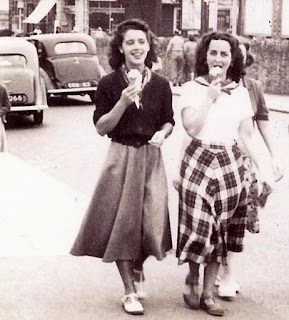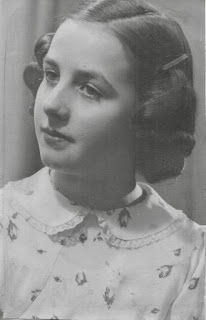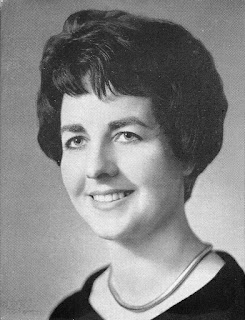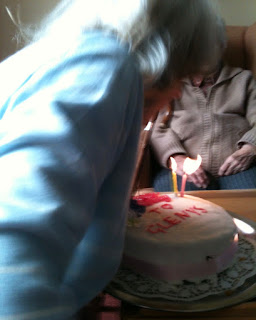My mum, Glenys, died a year ago today. It was not unexpected. She’d lived with dementia for more than twenty years, survived several near-death episodes, and had remarkable strength of spirit that kept her going, but this time she was irredeemably frail and had finally stopped eating before Christmas. For more than two weeks I kept vigil at her bedside; it was clear she would not see much, if any, of 2020. Given the subsequent traumas of the pandemic, I’m thankful she did not and we were able to have those precious last days together.
So I’d had many years to prepare, practically and emotionally. I’d already done so much of my grieving. But when the time came to write her eulogy, it was a challenge. Not the writing itself - as a professional scriptwriter, it’s been my job to condense vast swathes of narrative into a pithy broadcast slot, to weave multiple story strands and themes with a broad canvas of characters. But this was my mum. How could I do justice to her 93 years of life – nearly half before I was born – and honour the person she was, beneath the dementia that had eroded her own memory of herself?
 |
| Student days in Bangor: mum, right |
A person’s life in action is a kaleidoscope of experience, feeling, and collective memory, drawn together from fragments of many sources. It evolves over time, with the addition of new colours and textures, the view constantly shifting. Now there was only one source – me - and that kaleidoscope had crystallised somewhere in the early 2000s, when mum was last “herself” and properly knew me as her daughter.
Mum showed an early promise for singing, and began to train from childhood, when a neighbour, who happened to be a music teacher, heard her singing in the hallway. She quickly began to win prizes, including an engagement to sing on the BBC radio programme, Children’s Hour. The song she sang was ‘The Trout’ ('Die Forelle') by Schubert, which stayed in her repertoire when she became a professional; I used it in my radio play, The Things We Never Said.
After Chorley Grammar School, she was all set to go the Royal Manchester College of Music, where she’d already been a part-time student, but it was during WW2, and her parents were worried she’d be called up into the services. Her father was a teacher (a reserved occupation), so she was encouraged to follow in his footsteps, training at St Mary’s College, Bangor, in North Wales, with relatives nearby.
It was while she was appearing in a concert in Oxford that she met my father, Wai Kwong Ho. Born in Shanghai, he had come to the UK to study nuclear engineering at Imperial College, London University, and was at that time working at Harwell atomic research centre, near Oxford. He and mum found themselves staying in the same boarding house, and the rest is history!
Just before my eighth birthday (a time of power cuts and three-day weeks), we moved to Cheltenham in Gloucestershire, where the Central Electricity Generating Board, for whom dad worked, was opening a new headquarters. From that time to her retirement in 1990, mum taught at a local primary school and I accompanied her there for the first three years.
Anyone who knew her in those days would recall her warmth, generosity, kindness, and sense of fun. If she saw the ice cream van stopping outside the school, she would go out and buy ice creams for her whole class. The Christmas stockings she made with the kids, and filled with treats, became a much-loved tradition. One year she sent me out to buy the stocking-fillers, including jumping beans that were a fad in those days. I had a terrible time trying to count them out in the shop, because as soon as my hand was getting full, they would all jump out! (We couldn’t use them anyway, as it turned out, because they looked too much like antibiotics – a choking risk…)
My beloved dad, Wai, died of cancer at the age of only fifty-two, nine months after diagnosis, when I was in my final year at university, leaving mum widowed just before retirement and in the year that I left home. With hindsight, I believe that shock was the trigger for her earliest symptoms of dementia, heralding decades of escalating trauma that heartbreakingly took her memories, affected her personality, and ultimately made strangers of us.
Sadly, she did lose some friends over the years, because of her condition; but others proved touchingly loyal and have kept in contact with me to the last. In her latter years, I was immensely grateful for the kindness and dedication of staff who looked after her in two care homes; we could not have managed without them. Given mum’s great age when she died and her many years away from the outside world, I feared her funeral would be sparsely attended, but was moved to see many of her old friends and carers there – and to know that I was not the only person to remember her.



































